北师大版(2019)必修第三册Unit 7 Art 语法知识点课件(共24张PPT)
文档属性
| 名称 | 北师大版(2019)必修第三册Unit 7 Art 语法知识点课件(共24张PPT) |

|
|
| 格式 | pptx | ||
| 文件大小 | 750.3KB | ||
| 资源类型 | 教案 | ||
| 版本资源 | 北师大版(2019) | ||
| 科目 | 英语 | ||
| 更新时间 | 2024-04-14 17:19:48 | ||
图片预览

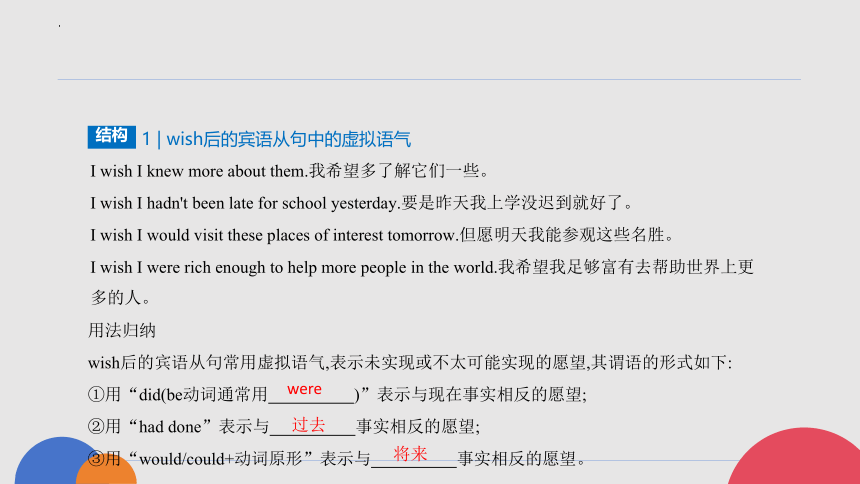
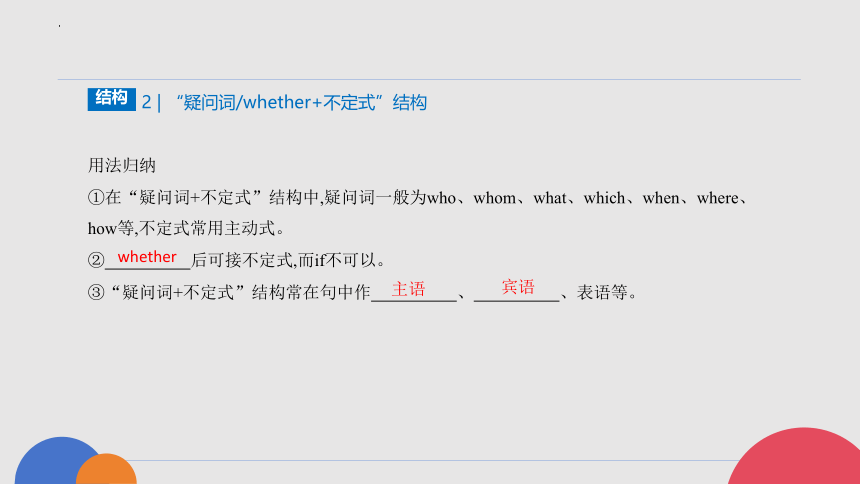
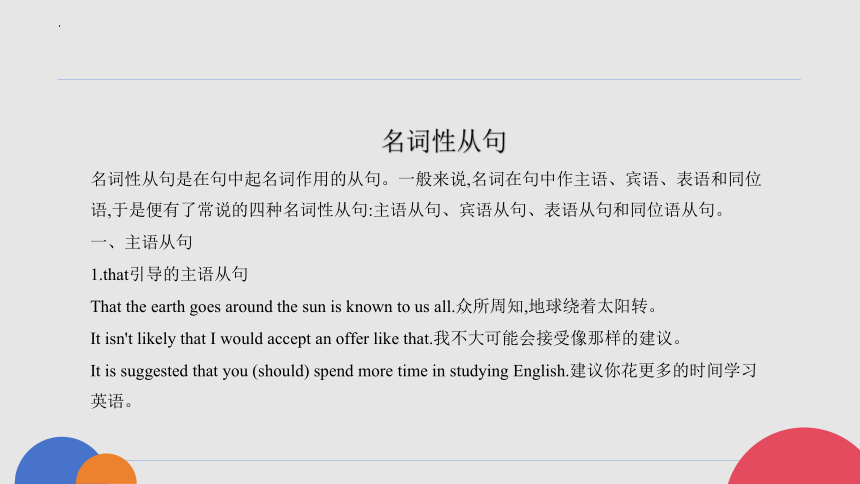
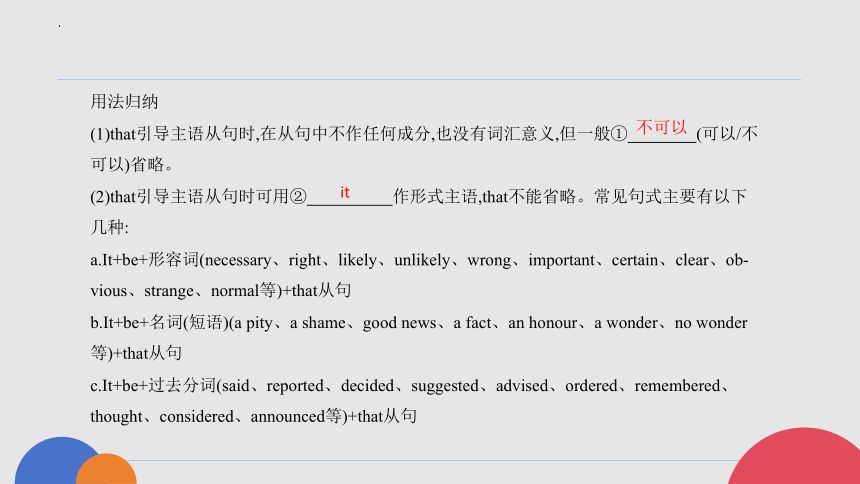
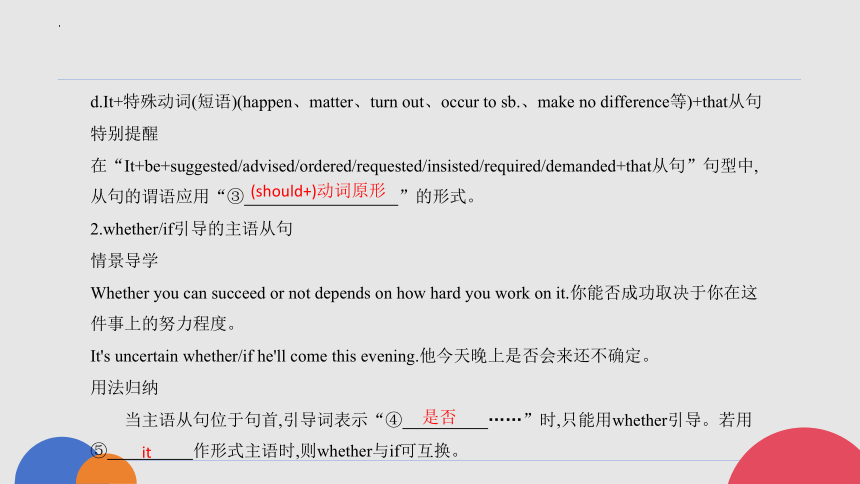

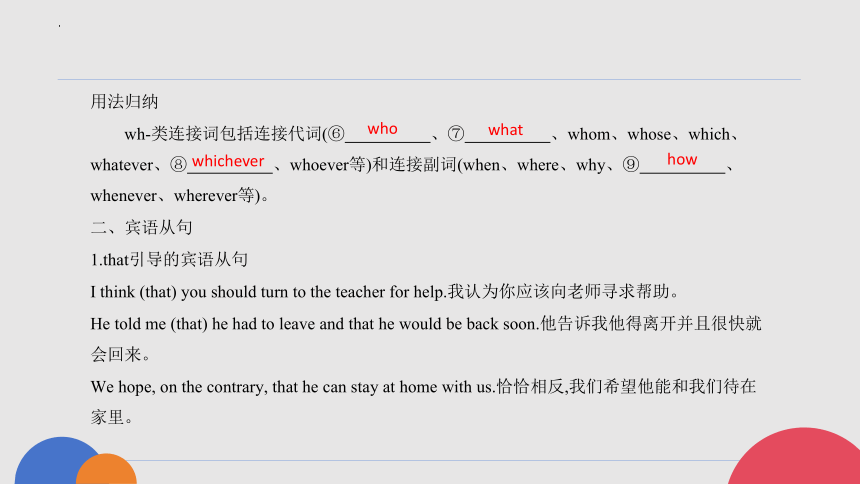
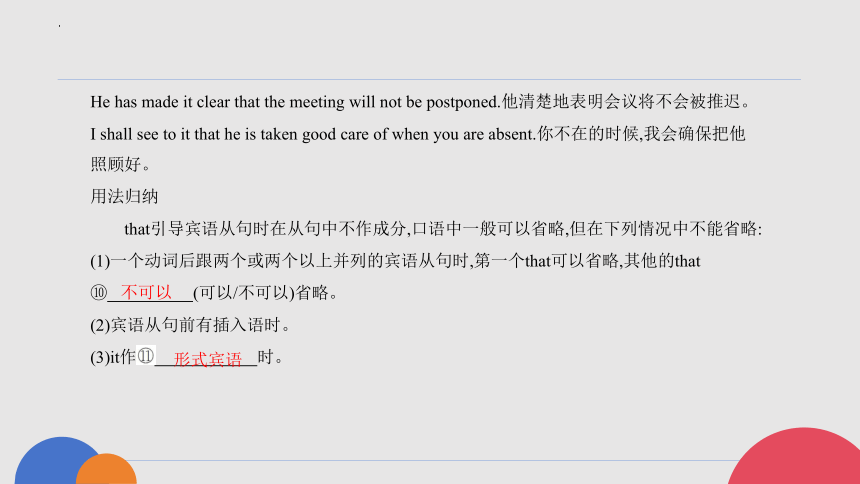
文档简介
(共24张PPT)
Unit 7 语法知识精讲
1 | wish后的宾语从句中的虚拟语气
I wish I knew more about them.我希望多了解它们一些。
I wish I hadn't been late for school yesterday.要是昨天我上学没迟到就好了。
I wish I would visit these places of interest tomorrow.但愿明天我能参观这些名胜。
I wish I were rich enough to help more people in the world.我希望我足够富有去帮助世界上更
多的人。
结构
用法归纳
wish后的宾语从句常用虚拟语气,表示未实现或不太可能实现的愿望,其谓语的形式如下:
①用“did(be动词通常用 )”表示与现在事实相反的愿望;
②用“had done”表示与 事实相反的愿望;
③用“would/could+动词原形”表示与 事实相反的愿望。
were
过去
将来
2 | “疑问词/whether+不定式”结构
结构
用法归纳
①在“疑问词+不定式”结构中,疑问词一般为who、whom、what、which、when、where、
how等,不定式常用主动式。
② 后可接不定式,而if不可以。
③“疑问词+不定式”结构常在句中作 、 、表语等。
whether
主语
宾语
名词性从句
名词性从句是在句中起名词作用的从句。一般来说,名词在句中作主语、宾语、表语和同位
语,于是便有了常说的四种名词性从句:主语从句、宾语从句、表语从句和同位语从句。
一、主语从句
1.that引导的主语从句
That the earth goes around the sun is known to us all.众所周知,地球绕着太阳转。
It isn't likely that I would accept an offer like that.我不大可能会接受像那样的建议。
It is suggested that you (should) spend more time in studying English.建议你花更多的时间学习
英语。
用法归纳
(1)that引导主语从句时,在从句中不作任何成分,也没有词汇意义,但一般① (可以/不
可以)省略。
(2)that引导主语从句时可用② 作形式主语,that不能省略。常见句式主要有以下
几种:
a.It+be+形容词(necessary、right、likely、unlikely、wrong、important、certain、clear、ob-
vious、strange、normal等)+that从句
b.It+be+名词(短语)(a pity、a shame、good news、a fact、an honour、a wonder、no wonder
等)+that从句
c.It+be+过去分词(said、reported、decided、suggested、advised、ordered、remembered、
thought、considered、announced等)+that从句
不可以
it
d.It+特殊动词(短语)(happen、matter、turn out、occur to sb.、make no difference等)+that从句
特别提醒
在“It+be+suggested/advised/ordered/requested/insisted/required/demanded+that从句”句型中,
从句的谓语应用“③ ”的形式。
2.whether/if引导的主语从句
情景导学
Whether you can succeed or not depends on how hard you work on it.你能否成功取决于你在这
件事上的努力程度。
It's uncertain whether/if he'll come this evening.他今天晚上是否会来还不确定。
用法归纳
当主语从句位于句首,引导词表示“④ ……”时,只能用whether引导。若用
⑤ 作形式主语时,则whether与if可互换。
(should+)动词原形
是否
it
3.wh-类连接词引导的主语从句
What makes the book so extraordinary is the creative imagination of the writer.让这本书如此非
同凡响的是作者有创造性的想象力。
It has not been decided yet who will take charge of the factory when the boss is away.老板不在
时谁将掌管这家工厂还没有决定。
How they will solve the serious problem has not been decided.他们将怎样解决这个严重的问题
还没有决定。
Whichever team wins on Saturday will go through to the national championships.周六获胜的队
将进入全国锦标赛。
用法归纳
wh-类连接词包括连接代词(⑥ 、⑦ 、whom、whose、which、
whatever、⑧ 、whoever等)和连接副词(when、where、why、⑨ 、
whenever、wherever等)。
二、宾语从句
1.that引导的宾语从句
I think (that) you should turn to the teacher for help.我认为你应该向老师寻求帮助。
He told me (that) he had to leave and that he would be back soon.他告诉我他得离开并且很快就
会回来。
We hope, on the contrary, that he can stay at home with us.恰恰相反,我们希望他能和我们待在
家里。
who
what
whichever
how
He has made it clear that the meeting will not be postponed.他清楚地表明会议将不会被推迟。
I shall see to it that he is taken good care of when you are absent.你不在的时候,我会确保把他
照顾好。
用法归纳
that引导宾语从句时在从句中不作成分,口语中一般可以省略,但在下列情况中不能省略:
(1)一个动词后跟两个或两个以上并列的宾语从句时,第一个that可以省略,其他的that
⑩ (可以/不可以)省略。
(2)宾语从句前有插入语时。
(3)it作 时。
不可以
形式宾语
2.whether/if引导的宾语从句
情景导学
I don't know whether or not the report is true.=I don't know whether/if the report is true or not.我
不知道这个报道是不是真的。
It depends on whether we have enough time.这取决于我们是否有充足的时间。
用法归纳
whether/if引导宾语从句时,在从句中不作任何成分,但有具体的含义,意为“是否”。在
下列情况中只能用whether而不能用if:
(1)宾语从句中直接与or not连用时,只能用 。
(2) 后的宾语从句要用whether。
whether
介词
3.wh-类连接词引导的宾语从句
情景导学
Think about what you want in the coming year, and then ask yourself why you want it.想想你在
即将到来的一年里想要什么,然后问问自己为什么想要它。
In my dream, I had a very vivid picture of where we used to live.在我的梦里,我们以前住过的地
方的画面非常清晰。
用法归纳
wh-类连接词包括连接代词和连接副词,引导宾语从句时既充当句子成分又有具体词义,
且不可省略。
三、表语从句
1.that引导的表语从句
情景导学
The reason for your mistake is that you lack confidence.你犯错误的原因是你缺乏自信。
My advice is that you (should) think it over before you make a decision.我的建议是你做决定之
前仔细考虑一下。
用法归纳
(1)that引导表语从句时在从句中不充当成分,没有词汇意义,通常不能省略。
(2)当主句的主语是表示“建议,要求,命令”的词(如suggestion、advice、order、demand等)
时,表语从句的谓语常用“ ”的形式。
(should+)动词原形
2.whether引导的表语从句
情景导学
The problem is whether air pollution can be controlled.问题是空气污染能否被控制住。
用法归纳
(1)whether引导表语从句时在从句中不充当成分,意为“是否”。
(2)if不能引导表语从句。
3.wh-类连接词引导的表语从句
情景导学
Times aren't what they were.时代不同了。
The problem is who will take over this shop.问题是谁将接管这家店铺。
That is when I realized the importance of journalism.那时我才意识到新闻工作的重要性。
用法归纳
wh-类连接词引导表语从句时既充当句子成分又有具体词义,且 (可以/不可
以)省略。
4.because、why引导的表语从句
情景导学
He failed. That is because he didn't work hard.他失败了。那是因为他没有努力工作。
It's really important to hear what experts say, and that's why we've invited Emma here.听听专家
说的真的很重要,那就是我们邀请埃玛来这儿的原因。
用法归纳
(1)It/This/That is because...这/那是因为……
(2)It/This/That is why...
不可以
这/那是……的原因
5.as if/as though引导的表语从句
情景导学
When fat and salt are removed from food, the food tastes as if it is missing something.当脂肪和
盐分从食物中去除后,食物尝起来就好像缺失了什么东西。
The thick smog covered the whole city. It was as if/as though a great black blanket had been
thrown over it.浓雾覆盖着整座城市,好像一块巨大的黑色毯子被扔到了它的上面。
用法归纳
(1)as if/as though引导的表语从句常跟在特定的系动词后,如seem、appear、look、taste、
sound、feel等。
(2)as if/as though引导的表语从句表示与事实相反时,从句常用虚拟语气。
四、同位语从句
情景导学
The report that he was going to resign was false.他将辞职的报道是假的。
The student asked me the question whether the book was worth reading.学生问了我这个问题:这
本书是否值得一读。
I have no idea why he was excited at that time.我不知道当时他为什么很兴奋。
用法归纳
(1)同位语从句在句中作某一名词(如news、report、fact、idea、desire、suggestion、ques-
tion、promise、information等)的同位语,一般位于该名词之后,解释说明其具体内容。
(2)引导同位语从句的连接词有that、whether、who、why、where、how、when等。在同位
语从句中,that和whether不作成分,that (有/无)词义,whether表示“是否”,if不
能引导同位语从句。
无
(3)引导同位语从句的连接词一般不能省略。
特别提醒
定语从句和同位语从句都可以用来修饰名词,但定语从句用来说明名词的性质、特征、来源
等,关系词在从句中充当某一成分;而同位语从句则解释说明名词的具体内容。
The news that our team won the game excited us all.我们队赢得比赛的消息使我们所有人都
很兴奋。(同位语从句)
The news that was broadcast on the radio this morning is not true at all.今天早上广播播送的
那则新闻一点儿也不真实。(定语从句)
构词法
情景导学1
real adj.真实的→reality n.现实
judge v.判断→judgement n.判断力
violent adj.暴力的→violently adv.凶猛地
comfort v.安慰→comfortable adj.舒服的
different adj.不同的→difference n.差别
用法归纳1
同根词是指在同一语种中词根相同、意义相似的词。其常见的变化规律如下:
(1)部分动词+① 构成名词。如:agree v.同意→agreement n.同意。
(2)大部分形容词+-ly 构成② 。如:quick adj.迅速的→quickly adv.迅速地。
-ment
副词
(3)部分以t结尾的③ ,变t为ce构成名词。如:important adj.重要的→importance n.
重要。
(4)部分形容词+-ity构成④ 。如:punctual adj.准时的→punctuality n.准时性。
(5)部分动词+-able构成形容词。如:depend v.信赖→dependable adj.可信赖的。
情景导学2
fit adj.适合的→unfit adj.不适合的
agree v.同意→disagree v.不同意
large adj.大的→enlarge v.扩大
possible adj.可能的→impossible adj.不可能的
correct adj.正确的→incorrect adj.不正确的
regular adj.有规律的→irregular adj.无规律的
形容词
名词
legal adj.合法的→illegal adj.非法的
use v.使用→misuse v.误用
sense n.见识;良好的判断→nonsense n.愚蠢的行为;谬论
write v.写→rewrite v.重写
social adj.好交际的→asocial adj.避免社交的
communications n.通信→telecommunications n.电信;电讯
company n.公司→intercompany adj.公司间的
用法归纳2
前缀通常只改变词义,不改变词性。
1.表示否定的前缀有:⑤ 。
un-;dis-;im-;in-;ir-;il-;non-;a-
2.表示其他意义的前缀:
(1)mis-表示“错误,坏”;
(2)re-表示“再,重新,重复”;
(3)tele-表示“远程的,远距离的”;
(4)⑥ 表示“使”,构成动词;
(5)inter-表示“在……之间,互相”。
en-
即时巩固
Ⅰ.单句语法填空
1.It presents live (entertain), including pop, rock, folk, jazz, musicals,
dance, world music, films and classical music.
2.It (sudden) became very clear to me how lucky I was to be fluent in two
languages.
3.China has a (responsible) to work with other countries to promote
the healthy development of the tea industry.
4.It is of great (important) to relax our body.
5.Because I tied a rope around his waist, he was (comfortable) and his crying let the
whole campground know it.
entertainment
suddenly
responsibility
importance
uncomfortable
6.It might sound like one long, expensive vacation, but the couple has an unusual way to make
their travel (afford).
Ⅱ.完成句子
1.很容易解释我们是如何查明气味是不是危险的。
It's easy to explain how we determine .
2.我爷爷带我去了博物馆,我对在那儿的墙上所看到的东西反应非常强烈。
My grandfather took me to the museum, and I responded very strongly to on the
walls there.
3.对我来说,训练最难的部分是我受伤了。
The hardest part of the training for me is .
affordable
whether smells are dangerous or not
what I saw
that I got an injury
4.据报道,在这次地震中已经有很多人丧生。
many people have lost their lives in the earthquake.
5.他遇到了交通堵塞,那就是他错过航班的原因。
He was caught in the traffic jam and he missed the flight.
6.谁将出席开幕式还没有决定。
hasn't been decided.
It is reported that
that is why
Who will attend the opening ceremony
Unit 7 语法知识精讲
1 | wish后的宾语从句中的虚拟语气
I wish I knew more about them.我希望多了解它们一些。
I wish I hadn't been late for school yesterday.要是昨天我上学没迟到就好了。
I wish I would visit these places of interest tomorrow.但愿明天我能参观这些名胜。
I wish I were rich enough to help more people in the world.我希望我足够富有去帮助世界上更
多的人。
结构
用法归纳
wish后的宾语从句常用虚拟语气,表示未实现或不太可能实现的愿望,其谓语的形式如下:
①用“did(be动词通常用 )”表示与现在事实相反的愿望;
②用“had done”表示与 事实相反的愿望;
③用“would/could+动词原形”表示与 事实相反的愿望。
were
过去
将来
2 | “疑问词/whether+不定式”结构
结构
用法归纳
①在“疑问词+不定式”结构中,疑问词一般为who、whom、what、which、when、where、
how等,不定式常用主动式。
② 后可接不定式,而if不可以。
③“疑问词+不定式”结构常在句中作 、 、表语等。
whether
主语
宾语
名词性从句
名词性从句是在句中起名词作用的从句。一般来说,名词在句中作主语、宾语、表语和同位
语,于是便有了常说的四种名词性从句:主语从句、宾语从句、表语从句和同位语从句。
一、主语从句
1.that引导的主语从句
That the earth goes around the sun is known to us all.众所周知,地球绕着太阳转。
It isn't likely that I would accept an offer like that.我不大可能会接受像那样的建议。
It is suggested that you (should) spend more time in studying English.建议你花更多的时间学习
英语。
用法归纳
(1)that引导主语从句时,在从句中不作任何成分,也没有词汇意义,但一般① (可以/不
可以)省略。
(2)that引导主语从句时可用② 作形式主语,that不能省略。常见句式主要有以下
几种:
a.It+be+形容词(necessary、right、likely、unlikely、wrong、important、certain、clear、ob-
vious、strange、normal等)+that从句
b.It+be+名词(短语)(a pity、a shame、good news、a fact、an honour、a wonder、no wonder
等)+that从句
c.It+be+过去分词(said、reported、decided、suggested、advised、ordered、remembered、
thought、considered、announced等)+that从句
不可以
it
d.It+特殊动词(短语)(happen、matter、turn out、occur to sb.、make no difference等)+that从句
特别提醒
在“It+be+suggested/advised/ordered/requested/insisted/required/demanded+that从句”句型中,
从句的谓语应用“③ ”的形式。
2.whether/if引导的主语从句
情景导学
Whether you can succeed or not depends on how hard you work on it.你能否成功取决于你在这
件事上的努力程度。
It's uncertain whether/if he'll come this evening.他今天晚上是否会来还不确定。
用法归纳
当主语从句位于句首,引导词表示“④ ……”时,只能用whether引导。若用
⑤ 作形式主语时,则whether与if可互换。
(should+)动词原形
是否
it
3.wh-类连接词引导的主语从句
What makes the book so extraordinary is the creative imagination of the writer.让这本书如此非
同凡响的是作者有创造性的想象力。
It has not been decided yet who will take charge of the factory when the boss is away.老板不在
时谁将掌管这家工厂还没有决定。
How they will solve the serious problem has not been decided.他们将怎样解决这个严重的问题
还没有决定。
Whichever team wins on Saturday will go through to the national championships.周六获胜的队
将进入全国锦标赛。
用法归纳
wh-类连接词包括连接代词(⑥ 、⑦ 、whom、whose、which、
whatever、⑧ 、whoever等)和连接副词(when、where、why、⑨ 、
whenever、wherever等)。
二、宾语从句
1.that引导的宾语从句
I think (that) you should turn to the teacher for help.我认为你应该向老师寻求帮助。
He told me (that) he had to leave and that he would be back soon.他告诉我他得离开并且很快就
会回来。
We hope, on the contrary, that he can stay at home with us.恰恰相反,我们希望他能和我们待在
家里。
who
what
whichever
how
He has made it clear that the meeting will not be postponed.他清楚地表明会议将不会被推迟。
I shall see to it that he is taken good care of when you are absent.你不在的时候,我会确保把他
照顾好。
用法归纳
that引导宾语从句时在从句中不作成分,口语中一般可以省略,但在下列情况中不能省略:
(1)一个动词后跟两个或两个以上并列的宾语从句时,第一个that可以省略,其他的that
⑩ (可以/不可以)省略。
(2)宾语从句前有插入语时。
(3)it作 时。
不可以
形式宾语
2.whether/if引导的宾语从句
情景导学
I don't know whether or not the report is true.=I don't know whether/if the report is true or not.我
不知道这个报道是不是真的。
It depends on whether we have enough time.这取决于我们是否有充足的时间。
用法归纳
whether/if引导宾语从句时,在从句中不作任何成分,但有具体的含义,意为“是否”。在
下列情况中只能用whether而不能用if:
(1)宾语从句中直接与or not连用时,只能用 。
(2) 后的宾语从句要用whether。
whether
介词
3.wh-类连接词引导的宾语从句
情景导学
Think about what you want in the coming year, and then ask yourself why you want it.想想你在
即将到来的一年里想要什么,然后问问自己为什么想要它。
In my dream, I had a very vivid picture of where we used to live.在我的梦里,我们以前住过的地
方的画面非常清晰。
用法归纳
wh-类连接词包括连接代词和连接副词,引导宾语从句时既充当句子成分又有具体词义,
且不可省略。
三、表语从句
1.that引导的表语从句
情景导学
The reason for your mistake is that you lack confidence.你犯错误的原因是你缺乏自信。
My advice is that you (should) think it over before you make a decision.我的建议是你做决定之
前仔细考虑一下。
用法归纳
(1)that引导表语从句时在从句中不充当成分,没有词汇意义,通常不能省略。
(2)当主句的主语是表示“建议,要求,命令”的词(如suggestion、advice、order、demand等)
时,表语从句的谓语常用“ ”的形式。
(should+)动词原形
2.whether引导的表语从句
情景导学
The problem is whether air pollution can be controlled.问题是空气污染能否被控制住。
用法归纳
(1)whether引导表语从句时在从句中不充当成分,意为“是否”。
(2)if不能引导表语从句。
3.wh-类连接词引导的表语从句
情景导学
Times aren't what they were.时代不同了。
The problem is who will take over this shop.问题是谁将接管这家店铺。
That is when I realized the importance of journalism.那时我才意识到新闻工作的重要性。
用法归纳
wh-类连接词引导表语从句时既充当句子成分又有具体词义,且 (可以/不可
以)省略。
4.because、why引导的表语从句
情景导学
He failed. That is because he didn't work hard.他失败了。那是因为他没有努力工作。
It's really important to hear what experts say, and that's why we've invited Emma here.听听专家
说的真的很重要,那就是我们邀请埃玛来这儿的原因。
用法归纳
(1)It/This/That is because...这/那是因为……
(2)It/This/That is why...
不可以
这/那是……的原因
5.as if/as though引导的表语从句
情景导学
When fat and salt are removed from food, the food tastes as if it is missing something.当脂肪和
盐分从食物中去除后,食物尝起来就好像缺失了什么东西。
The thick smog covered the whole city. It was as if/as though a great black blanket had been
thrown over it.浓雾覆盖着整座城市,好像一块巨大的黑色毯子被扔到了它的上面。
用法归纳
(1)as if/as though引导的表语从句常跟在特定的系动词后,如seem、appear、look、taste、
sound、feel等。
(2)as if/as though引导的表语从句表示与事实相反时,从句常用虚拟语气。
四、同位语从句
情景导学
The report that he was going to resign was false.他将辞职的报道是假的。
The student asked me the question whether the book was worth reading.学生问了我这个问题:这
本书是否值得一读。
I have no idea why he was excited at that time.我不知道当时他为什么很兴奋。
用法归纳
(1)同位语从句在句中作某一名词(如news、report、fact、idea、desire、suggestion、ques-
tion、promise、information等)的同位语,一般位于该名词之后,解释说明其具体内容。
(2)引导同位语从句的连接词有that、whether、who、why、where、how、when等。在同位
语从句中,that和whether不作成分,that (有/无)词义,whether表示“是否”,if不
能引导同位语从句。
无
(3)引导同位语从句的连接词一般不能省略。
特别提醒
定语从句和同位语从句都可以用来修饰名词,但定语从句用来说明名词的性质、特征、来源
等,关系词在从句中充当某一成分;而同位语从句则解释说明名词的具体内容。
The news that our team won the game excited us all.我们队赢得比赛的消息使我们所有人都
很兴奋。(同位语从句)
The news that was broadcast on the radio this morning is not true at all.今天早上广播播送的
那则新闻一点儿也不真实。(定语从句)
构词法
情景导学1
real adj.真实的→reality n.现实
judge v.判断→judgement n.判断力
violent adj.暴力的→violently adv.凶猛地
comfort v.安慰→comfortable adj.舒服的
different adj.不同的→difference n.差别
用法归纳1
同根词是指在同一语种中词根相同、意义相似的词。其常见的变化规律如下:
(1)部分动词+① 构成名词。如:agree v.同意→agreement n.同意。
(2)大部分形容词+-ly 构成② 。如:quick adj.迅速的→quickly adv.迅速地。
-ment
副词
(3)部分以t结尾的③ ,变t为ce构成名词。如:important adj.重要的→importance n.
重要。
(4)部分形容词+-ity构成④ 。如:punctual adj.准时的→punctuality n.准时性。
(5)部分动词+-able构成形容词。如:depend v.信赖→dependable adj.可信赖的。
情景导学2
fit adj.适合的→unfit adj.不适合的
agree v.同意→disagree v.不同意
large adj.大的→enlarge v.扩大
possible adj.可能的→impossible adj.不可能的
correct adj.正确的→incorrect adj.不正确的
regular adj.有规律的→irregular adj.无规律的
形容词
名词
legal adj.合法的→illegal adj.非法的
use v.使用→misuse v.误用
sense n.见识;良好的判断→nonsense n.愚蠢的行为;谬论
write v.写→rewrite v.重写
social adj.好交际的→asocial adj.避免社交的
communications n.通信→telecommunications n.电信;电讯
company n.公司→intercompany adj.公司间的
用法归纳2
前缀通常只改变词义,不改变词性。
1.表示否定的前缀有:⑤ 。
un-;dis-;im-;in-;ir-;il-;non-;a-
2.表示其他意义的前缀:
(1)mis-表示“错误,坏”;
(2)re-表示“再,重新,重复”;
(3)tele-表示“远程的,远距离的”;
(4)⑥ 表示“使”,构成动词;
(5)inter-表示“在……之间,互相”。
en-
即时巩固
Ⅰ.单句语法填空
1.It presents live (entertain), including pop, rock, folk, jazz, musicals,
dance, world music, films and classical music.
2.It (sudden) became very clear to me how lucky I was to be fluent in two
languages.
3.China has a (responsible) to work with other countries to promote
the healthy development of the tea industry.
4.It is of great (important) to relax our body.
5.Because I tied a rope around his waist, he was (comfortable) and his crying let the
whole campground know it.
entertainment
suddenly
responsibility
importance
uncomfortable
6.It might sound like one long, expensive vacation, but the couple has an unusual way to make
their travel (afford).
Ⅱ.完成句子
1.很容易解释我们是如何查明气味是不是危险的。
It's easy to explain how we determine .
2.我爷爷带我去了博物馆,我对在那儿的墙上所看到的东西反应非常强烈。
My grandfather took me to the museum, and I responded very strongly to on the
walls there.
3.对我来说,训练最难的部分是我受伤了。
The hardest part of the training for me is .
affordable
whether smells are dangerous or not
what I saw
that I got an injury
4.据报道,在这次地震中已经有很多人丧生。
many people have lost their lives in the earthquake.
5.他遇到了交通堵塞,那就是他错过航班的原因。
He was caught in the traffic jam and he missed the flight.
6.谁将出席开幕式还没有决定。
hasn't been decided.
It is reported that
that is why
Who will attend the opening ceremony
同课章节目录
- Unit 7 Art
- Lesson 1 Masterpieces
- Lesson 2 Beijing Opera
- Lesson 3 A Musical Genius
- Unit 8 Green living
- Lesson 1 Roots and Shoots
- Lesson 2 Greening the Desert
- Lesson 3 "White Bikes" on the Road
- Unit 9 Learning
- Lesson 1 Active Learning
- Lesson 2 Language Learning Tips
- Lesson 3 The Secrets of Your Memory
